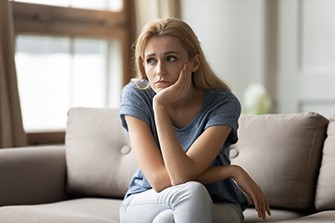Dangers of Overdosing During Coronavirus Quarantine
During this coronavirus pandemic, there are many risks posed to people who have an addiction. Because forced isolation can create a perfect storm for relapsing or worsening an addiction, the dangers of overdosing during the coronavirus quarantine become very real. Learn what you can do to help ease your biggest triggers so that you get help before it ever becomes a situation where you’ve overdosed.
Dangers of Overdosing During Coronavirus Quarantine #1: Increased Stress Levels
According to the National Institutes of Health, it has long been known that stress increases the risk of relapse. Clinical observations, surveys, and epidemiological studies document an association between self-reports of stressors and subsequent return to using. It is common for people to relapse due to stress and, right now, there is plenty of that going around.
There is a good chance you may have lost your job, have reduced hours, or are otherwise impacted financially. You may be struggling to pay bills, finding it difficult to file for unemployment or you are worried about your client base once this pandemic is over. Not to mention you’re trying to stay home so you don’t end up catching this unpredictable virus. Nobody’s life is the same right now as it was in February 2020, which is important to remember.
How to Handle Increased Stress Levels
All of the worries associated with the coronavirus pandemic is sure to cause increased stress levels, which can quickly lead to anxiety and worsening depression. All of these things can add up to a relapse or a worsening of existing drug and alcohol use. Here are some things you can do to ease your stress:
- Eat healthily; unhealthy foods can worsen depression and anxiety.
- Stay active by going on secluded walks or doing at-home workouts.
- Keep yourself busy with daily goals and chores to take your mind off things.
- Lean on your support system to let them know how you’re feeling.
Dangers of Overdosing #2: Forced Isolation
Addiction thrives in isolation. Due to forced isolation because of the coronavirus, people living with addiction won’t have to hide their use, make excuses for their actions, be accountable for their whereabouts, or otherwise need reasons for isolating from friends and family. Isolation coupled with the idea that you’re close to relapse or are already using can be just the thing to send you into a deadly overdose situation.
If you are worried that the quarantine may become too triggering for you, or if you feel like your addiction is worsening, here are some steps you can take:
- Check for some online AA or NA meetings you can join via Zoom.
- Ask loved ones if there’s someone who can check up on you, while also following social distancing rules.
- Make a big effort to stay in touch with friends and family, especially when you are feeling down, and do not ignore calls from friends and family who are checking on you.
- Give Cliffside Malibu or another reputable recovery center a call if you need to consider checking in someplace safe.
Dangers of Overdosing #3: Limited Access to Help or Support
During this unique time where everyone is encouraged to stay home and distance themselves from others, you may feel like you have very limited access to help or support during this time. This can cause deadly consequences since there could potentially be nobody around to help if you accidentally overdosed.
Detoxing alone at home is not recommended. Withdrawal symptoms can be debilitating and uncomfortable, which can quickly lead to relapse. In addition, some withdrawal symptoms, especially from alcohol, can be life-threatening.
If you feel like you have limited access to help or support, here are some resources:
- Call 911 if you’re experiencing an overdose. If you are experiencing the early signs of an overdose, don’t wait. Make sure you call 911 immediately. Early signs include rapid heartbeat, chest pains, difficulty breathing, confusion, and increased body temperature.
- Have Narcan handy. Narcan can reverse an opioid overdose. It is available over-the-counter at most drug stores, so make sure you have some on-hand and that you and your family know how to use it.
- Call our admissions office. We are still open and able to help you during this time if you find that your addiction has spiraled out of control or if you are experiencing a relapse.
Though the coronavirus quarantine can make you feel very alone in your addiction or certain behaviors can be triggered, you’re never too far from help and support. We are still open during this time and can help you through it. There is no better place to be than treatment during a time like this.
About Cliffside Malibu
Because no two addictions are the same, we develop individualized treatment plans for every client at Cliffside Malibu. We are committed to providing evidence-based treatment through a continuum of care model across a range of levels of care, including medically supervised detox, residential treatment, day treatment, and outpatient services. Our program includes family therapy and holistic therapy. Whether an individual is suffering from substance abuse and/or alcohol addiction, our programs are structured to create a supportive environment where healing can begin.
In addition to world-class treatment, Cliffside Malibu offers luxury accommodations, a serene environment, five-star dining, and plentiful amenities. We understand that addiction treatment is a rigorous process. Therefore, we provide for your comfort and relaxation at every turn, allowing you to rejuvenate, and meet the demands of treatment with your greatest energy and attention.
For more information, visit Cliffside Malibu.
